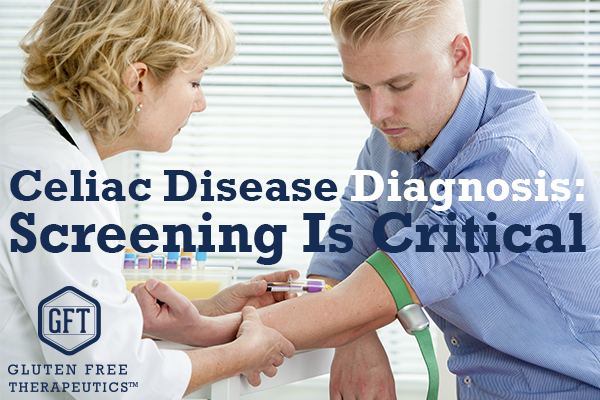
87% of people with celiac disease are not diagnosed
Recently, the media has been publishing more information about celiac disease. And that’s a good thing for a few reasons: For people who’ve been dealing the disease for years, drawing attention to the problems associated with living a gluten-free life has helped spur food companies and product manufacturers to produce gluten-free products. And of course, the added attention also has helped those who’ve been experiencing symptoms seek a proper diagnosis.
But unfortunately, the increased media attention has also spawned a lot of self-diagnoses from people who may be suffering from the symptoms of celiac disease but never “bother” to be formally diagnosed. It is estimated that 87% of people who have celiac disease have never been diagnosed. These people tend to turn to gluten-free diets as a panacea for whatever ails them, but the fact is, unless you’re diagnosed with celiac disease, avoiding foods with gluten can do more harm than good. What’s more, self-diagnosing based on a set of symptoms leaves a significant chance for error, which means another underlying disease can go undiagnosed. Not knowing if celiac disease is present can be harmful in the long run. It is of critical importance to know if an autoimmune disease (celiac disease) is present. Finally, for people who do have celiac disease, following a gluten-free diet for a period of time before being tested can trigger inaccurate test results, delaying a correct diagnosis as well as proper treatment.
The bottom line: Men and women who exhibit the symptoms of celiac disease need to be screened ASAP to avoid potential nutritional deficiencies and get the treatment their underlying condition requires.
Celiac Disease Diagnosis
Being informed about how celiac disease is diagnosed can be helpful. The first step in diagnosis is usually a blood test, designed to look for elevated levels of a specific type of antibody that develops when the immune system is incorrectly triggered. When antibody levels are not elevated, your doctor will likely begin looking for other potential culprits, like Crohn’s disease, lactose intolerance, bacterial overgrowth, irritable bowel syndrome, inflammatory bowel disease, and some types of cancer. But when antibodies are higher than normal, the next step is to have a bowel biopsy to confirm the diagnosis of celiac disease. The blood test is the first step, it provides information your doctor may need to determine if the next step is recommended.
Having a biopsy taken is the only definitive way to diagnose celiac disease. Now, no one eagerly looks forward to a bowel biopsy, but the fact is, the peace of mind you’ll gain from knowing for sure whether or not you have celiac disease is worth the minor inconvenience. Plus, the process itself is relatively straightforward, and it can be performed under light general sedation, which means you’ll likely “sleep” through it or at least not be concerned with what is happening.
The biopsy procedure is performed endoscopically, using a long, flexible instrument inserted through the mouth and throat to access the upper portion of the small intestine. This is the section of the intestine called the duodenum. The duodenum is located right after the stomach and is where the nutrients from the food that passes along the intestinal tract are absorbed for utilization in the body. A camera allows the lining to be visualized allowing the doctor to see the extent of the damage to the intestinal wall. Then a tiny instrument enables the doctor to obtain a small tissue sample from the surface of the intestine. This sample will be evaluated under a microscope giving them important information that cannot be obtained in a blood sample. What will they look for? Specifically, they want to look for signs of inflammation and damage to the villi, tiny finger-like projections that line the small intestine and help it absorb nutrients. It’s these villi that are attacked and destroyed by the immune system in people who have celiac disease. This is where the damage to the intestinal wall occurs which causes the nutritional deficiencies that celiac patients experience. Those deficiencies in turn create many of the symptoms of celiac disease.
“Once a diagnosis is reached treatment can take place and the healing process can begin. Many people self-diagnose by eliminating gluten and never get a clinical diagnosis. Obtaining an accurate diagnosis is an essential step to recovery. Your health could depend on it. It is our hope that writing about the diagnostic process will encourage people to take that very important step.“
– Leigh Reynolds, President of Gluten Free Therapeutics.
Good Nutrition Is Critical
Being diagnosed early means you can start taking the steps to maintain your health. That includes making sure you take supplements needed to make up for nutrients your small intestine is no longer absorbing properly. CeliVites by Gluten Free Therapeutics are designed specifically for celiac patients, eliminating gluten from the products themselves as well as from the manufacturing process, which often results in cross-contamination of many products labeled “gluten free.” Getting proper nutrition is critical to leading a healthy life. Learn more about CeliVites here.
This information is provided by GFT to inform and educate. It is not to be used as a substitute for medical advice. We recommend that this and any other medical questions be discussed with a medical health professional.
This original article is made possible by Gluten Free Therapeutics. Our mission is to educate, inform, and provide the most effective nutritional products possible to allow those with celiac disease and serious gluten intolerances to heal their bodies. CeliVites complete line of superior gluten free supplements includes multivitamin/multimineral supplements, iron supplements, and calcium supplements for people living with celiac disease. All CeliVites products are designed to help you heal, restore and rebuild your body, because going gluten free isn’t enough!
Comments ()
















I have family members that self diagnosed. They went gluten free and never went to the doctor. They feel better but now that I have read this I am going to recommend that they find out if they are celiac or allergic. Thanks for clearing up some questions I had on this subject.
I had all tests done. They all came up negative. I finally took a DNA test through 23andme.com and it confirmed that I have a high risk of developing Celiac. So in other words a test is inconclusive until you become full blown Celiac. I also have Hashimoto’s disease which was Doctor diagnosed. People with Hashi’s should never consume gluten. Honestly, it’s a given. Some of us have to self diagnose if the tests do not provide us with solid results. I hope this helps.
Your insight is helpful in regards to the testing sometimes being unreliable. All autoimmune diseases are very difficult to diagnose. That is one of the reason that the time frame for diagnosis can be so long. If patients think they have celiac or any other autoimmune disease they need to advocate for themselves and keep looking as you did for the answer. thank you for sharing.
Is your blood type O- RH-? This is very important. I am writing a book at the moment about some connections. Let me know. Blessed be
The doctor told me the blood test definitely showed that I have Celiacs but the colonoscopy was inconclusive. I have had iron deficienies for a year and when I went gluten free my level came back up to normal. I get blood work done every 6 months and I always seem to be lacking in one thing or another. And off gluten made me feel a lot better too. I am certain that even though the colonoscopy did not show it that I do have Celiacs.
Either you are confused about what test you had, or the doctor performed the wrong test! A colonoscopy doesn’t get to the upper small intestine. You need an Endoscopy done through the mouth through the stomach.
My villi was not good. I went gluten and lactose free. Then I was no longer lactose intolerant just the gluten. It always gives me stomach aches for years befoire being diagnosed and unable to control bowels from time to time. Still I have that problem if I slip up.
I don’t feel a need to be diagnosed. Just like I don’t feel the need to have a doctor tell me I have a cold. What can they do…nothing! I control it with diet and supplements. I’m working with a naturalist on my allergies and feel I’ve had more success than with Western Medical doctors. Western medicine is prescription happy and not about healing! Those drugs they want us to take are killing people or worse maiming us for life! All so some corporation can make a huge profit. Not going to do it!
Denise I agree with you, the bowel biopsy blood screening is all extremely expensive. If you do not have insurance you are putting yourself into great debt. If you alleviate the symptoms through diet and use supplements to make sure you are deficient in nutrients.
I feel exactly the same way about the biopsy and meds. I was on the medical merry-go-round for over 6 yrs until my Fibromyalgia, Chronic Urticaria/Angioedema & Hashimoto’s thyroid was finally diagnosed properly, and in that time I was shuffled from one specialist to another who just kept writing me new prescriptions to treat symptoms. At the point that I was taking 14 Rx drugs a day and feeling no better I turned to Functional medicine. I and am now drug free, on a gluten-free diet and taking a number of vitamin, hormone & nutritional supplements. I feel better than I have in years and see no reason to change a thing.
I am self-diagnosed. When I asked the doctor for a diagnosis he said I would first have to eat gluten for a few weeks. No Way! I did that just to see for myself, prior to the discussion with doctor. I was in excruciating pain for a few hours. That was proof enough for me. I do find that I am vitamin and/or iron deficient at different times and work with the doctor to balance that out.
Most medical doctors do not understand gluten. I was sick for over 20 yrs, always progressively getting worse. I had multiple colonoscopies, endoscopies, stain & culture tests, Xrays, scans, blood tests, biopsies …you name it. During that long run, my health snowballed. They removed all my female organs, appendix and my gallbladder along with numerous exploratory surgeries including kidney stents and drugs for hundreds of stones. My stomach started bleeding several times so I was diagnosed as lactose intolerant & stopped diary products. Then I heard about gluten after years of drugs that could never stop the cramping, diarrhea and other horrid symptoms along with immense embarrassment. Voila! After a couple of months of gluten free, I was better than I had been in years. I am back on dairy and have done much better for about 3 yrs now. I have damage from the long period of misdiagnosis & useless invasive treatment including physical, mental and financial but I can eat 3 meals per day, travel without a lot of worry, eat at restaurants and have snacks without constant fear. Say what you may…gluten is a booger!
46 years – every decade a list of symptoms: migraines, fatigue, diarrhea, infertility, gall bladder taken out, hypothyroidism…the list goes on….I have known very little about celiac (other than people talking about gluten-free & eating a gluten-free item now & than.) But, apparently I have loved wheat the most, because I tried everything else 1st (no sugar, low fat, list of allergy type foods…). Needless to say, what gets me – I have seen a ton of doctors over the years (including a gastroenterologist) & no one mentioned Celiac testing. Now gluten free, for a few months after ordering 23&me & seeing I have the variant – I am now discovering through my own online reading, that there was testing available! All I ever heard was, “you have IBS, here’s a drug”; “you have migraines, here’s a drug”; “you have hypothyroidism, here’s a drug.”?????? Not 1 doctor suggested testing in 46 years. Now I find out that gluten free helps, & now doctor’s will have the audacity to say that I should of been tested?? What?? How does this help???? All I care about is feeling better/normal – not a stamp of approval to be inducted into the hall of “death by bread”= aka “Celiac”. What benefit is there at this point to have this label? 46 years of health hell is enough. What a coincidence I find out about this testing after going gluten free & read it on my own without any doctor. I will tell my doctor this week & I bet she will suggest testing . Well, I am certainly not going to eat 12 weeks of gluten to prove anything.